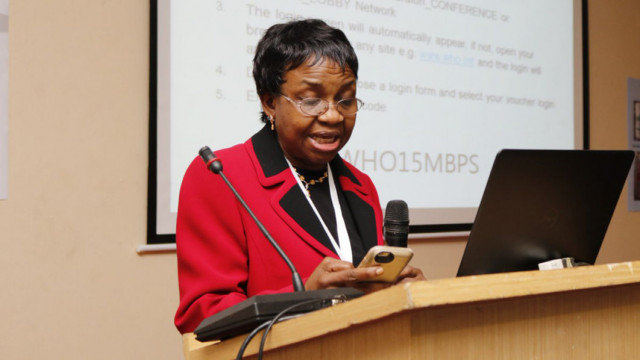The ongoing fight against counterfeit and substandard medical products by the National Agency for Food and Drug Administration and Control (NAFDAC) has achieved significant results.
Recently, the agency confiscated an estimated N1 trillion worth of fake medications from three major drug markets in Onitsha, Aba, and Lagos.
This prompted Director-General, Prof. Mojisola Adeyeye, to renew her appeal for capital punishment for those peddling fake drugs, whom she labeled as “merchants of death.”
Pointing out an instance where the importer of a dangerous drug substance received only a nominal sentence of five years in prison or a fine of N250,000, Adeyeye called for amendments to the current NAFDAC Act and the Counterfeit and Fake Drugs and Unwholesome Processed Foods Act to impose stricter penalties as a deterrent against current and future drug lords.
She also voiced her concerns over personal threats to her life and her staff, urging authorities to provide protection for operatives facing daily dangers.
The alarming rise of fake, expired, banned, harmful, and substandard medications in the country is troubling.
The ramifications of consuming counterfeit drugs are so profound that it is crucial to declare a state of emergency in the health sector.
This issue has severely threatened the health of Nigerians and has led to (and continues to lead to) numerous fatalities, including that of a sibling of former NAFDAC DG, Dr. Dora Akunyili (of blessed memory).
According to the late Dr. Akunyili, many patients are no longer responsive to legitimate antibiotics due to resistance caused by previous usage of fake antibiotics. If urgent measures are not taken to address this issue, the lives of every Nigerian resident are at risk from counterfeit medications.
While the suggested strong punitive measures are justified, the rise of fake drugs in the economy cannot solely be attributed to a weak criminal justice system.
A mix of factors, such as inadequate regulatory and quality controls, insufficient medical and research facilities, a lack of standard local drug production, ineffective migration mechanisms, corruption and unethical practices, inadequate consumer education, and economic hardship driven by a desire for quick wealth, contribute to the current infiltration of illegal drugs nationwide.
In essence, the prevalent fake drug epidemic results from inefficient regulatory systems, systemic failures, poor governance, and a lack of integrity.
Undeniably, regulatory bodies like NAFDAC, the Standards Organisation of Nigeria (SON), and various consumer protection agencies have not fulfilled their respective roles adequately.
For example, only in places like Nigeria are prescription drugs sold over the counter without medical advice. Furthermore, most counterfeit medications enter the country under the monitoring of SON and other relevant authorities.
Due to the negligence or failures of regulatory agencies, Nigeria has become a dumping ground for all kinds of illicit foreign medications.
Unfortunately, NAFDAC lacks global standard laboratories for proper testing of medical products. How can effective monitoring and quality control of drugs occur without sufficient facilities? The extent of systemic corruption is so severe that even original drugs available in Nigeria lack the potency seen in neighboring countries.
Reports from NAFDAC indicated that tests on various paracetamol products showed that none contained the required 500mg of the active ingredient. Additionally, there is a documented case of a banned UK milk product being sold in Nigeria as (an authentic) infant milk.
Clearly, the trade in counterfeit and substandard consumables flourishes in Nigeria mainly due to regulatory deficiencies, particularly at the enforcement level.
The lack of a single world-class public or privately owned drug manufacturing company in the entire country further underscores bad governance.
It is disheartening that Nigeria cannot claim to have any orthodox medication or vaccination produced entirely within its borders. Despite bearing the world's highest malaria burden, Nigeria lacks its own anti-malaria drugs or vaccinations.
It is shameful to admit that Nigeria relies on foreign solutions for its public health issues.
The situation has worsened with the departure of the few foreign pharmaceutical companies (like GlaxoSmithKline) due to an unfavorable business climate. The gap left by their exit is now being exploited by counterfeit drug dealers.
Moreover, the absence of regular awareness campaigns from relevant authorities contributes to the high rate of counterfeit drug usage. Nigerians lack sufficient scientific understanding to distinguish between genuine and counterfeit medications. Hence, it is the government's responsibility to ensure ongoing education for the populace about this issue.
The counterfeit drugs crisis has exacerbated the strain on the healthcare system exacerbated by the migration of healthcare workers. Counterfeit medications have overwhelmed the system, even penetrating pharmacies operated by teaching hospitals.
Therefore, without serious government intervention to rectify this anomaly, the system may collapse. The government must fully support the current crackdown on counterfeit drug dealers and address other urgent issues brought up by NAFDAC.
The individuals orchestrating the fake drug trade are not extraterrestrial; they are identifiable and traceable. Indeed, they are well-known to officials from regulatory agencies and members of the pharmaceutical professional community.
The illicit drug syndicate comprises a network of criminals including manufacturers (mostly foreign), importers, and intermediaries (distributors, wholesalers, retailers, government officials, etc.).
Tragically, Nigerians become complicit in their suffering as they actively participate in this racketeering. No foreigner can successfully import and distribute counterfeit drugs in Nigeria without local assistance.
It is essential for the government to urgently address this epidemic as it poses a grave threat to the lives of Nigerians. The system must be revamped! Regulators must acknowledge their duties or face harsh consequences.
The heads of various relevant agencies, including the federal and state health ministers, should be held accountable for every death resulting from counterfeit drug consumption.
The legal framework needs to be reinforced with harsher penalties – the option of a fine should be removed from our laws. Those involved in the counterfeit drug trade are murderers and should be treated as such by the law.




















